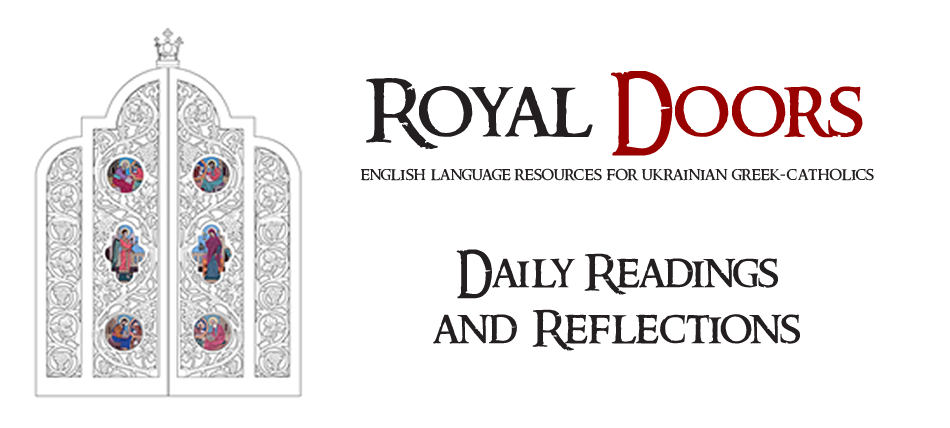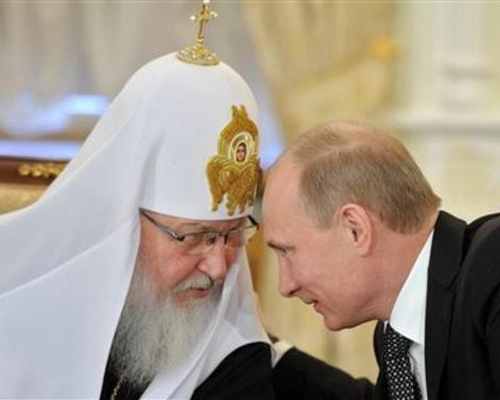
If we could imagine the instruments in a nation’s diplomatic kit as a set of keys, we’d find that some, like masters, fit a range of locks, while others must be cut to order. Before determining which type a given lock requires, we need to acknowledge that a lock exists at all.
When it comes to a lock at the heart of the conflict between Russia and the West over Ukraine, that’s yet to happen.
The Ukraine crisis is a gate beyond which loom global dangers so defining, one might expect that cooperation between Russia and the West would be an urgent priority. Right now, that gate has a lock on it — one that the Western diplomatic establishment has yet to acknowledge, let alone forge a key to fit.
With the Soviet Union in history’s bin, Western leaders such as President Obama assure us that the Russia of today’s headlines is ideology-free, meaning they have no reason to expand, and we’ve no reason to fear. But this is an academic observation, rendered moot by what it fails to see.
During the Cold War entering the foreign-service with a Soviet focus meant time spent learning the Russian language. The reason was obvious. Today, what’s less obvious is the need to engage the deeper language embedded in the substratum of cultural identity. In the case of Russia, and those countries sharing its linguistic root, that language is bound by a common religious tradition.
Under Vladimir Putin the Russian Federation has worked to fuse its identity with a destiny more compelling than the earthbound schemes of Karl Marx. Putin has a willing partner in his religious counterpart, Kirill I, Moscow Patriarch of the Russian Orthodox Church.
Leader of the largest Orthodox Church in the world, Kirill has supplied justification for the revival of a Church-State arrangement born in the Byzantine era of the emperor Justinian. Known as symphony, it proposes a harmony of cathedra and crown, each supporting the other in providential compliment.
In Ukraine, consequences can be tracked politically and geographically. Here, references to the Byzantine Empire are not flights to the arcane, but a matter of historical genetics bearing palpably on unfolding events.
Kirill’s role in the Russian symphony has put a heavy brake to the otherwise accelerating cause of Christian unity, impeding the urgent global service a unified Christianity is best able to provide. While the Russian Church has every reason to make a truly historic contribution to this unity, Kirill has instead sown divisions calculated to yield gains not just within the larger Orthodox Communion, but over it.
Russian desire to own Ukraine makes certain strategic sense. Concerns behind it were no doubt heightened by Western failure to address them with the seriousness due. Yet, under Putin, desire has morphed to claim — staked in large part by revising history into a mythologized Kiev-Rus, with its theme of Russia’s anointing. It’s this myth of Russkiy Mir that Putin invokes when declaring that Ukraine has never been anything but part of Russia.
Odds of this passing for history, sacred or otherwise, are boosted when draped in an omophorion. And Kirill has been generous with his. The Patriarch’s own ambitions, however, ran into a stumbling block called Maidan.
Contrary to the toxic campaign painting it as neo-nazi, leftist, and Jew-hating, Maidan is a revolution in progress — not against Russia, but rather the systemic corruption of Ukraine’s own government. In the events of Maidan, Kirill got a glimpse of that reality, and the possibility of his jump on the ecclesial chessboard turning to loss.
Of the three Orthodox churches in Ukraine, one is under the patronage of the Moscow Patriarchate. A fourth, the Ukrainian Greek Catholic Church (UGCC), follows Orthodox practice while maintaining communion with Rome. Toward the former, Kirill has been pressing a claim parallel to the Kremlin’s, namely, that these churches are part of Russkiy Mir, and as such, belong under Moscow.
The UGCC, on the other hand, has long been used by Moscow as leverage in its dealings with Rome. Yet under Kirill, accusations against it have grown shrill enough to suggest it was in the UGCC, not the Garden of Eden, that original sin made its debut.
These machinations were rebuffed at Maidan. In now famous images, clergy from these churches stood together in the Square’s hazardous breach, denouncing myriad yokes, and invoking their common Tradition to do so. Moreover, those images form a picture of the unity required for the Church to realize its vocation in a world agonized by so-called religious violence.
Comparisons have been drawn between the religious filament meant to illuminate Russia from within, and the triumphalism of would-be caliphates such as ISIS. Despite the tendency to exaggerate these, on a theocratic continuum Russian symphony has surely nudged it toward the ugly end of the scale.
Here are some things the two challenges share: each is coiled in a posture that treats the West as threat or enemy. Additionally, the posture of each is formed by a religious disposition that might be regarded as heterodox, expressed in language shaped accordingly.
As the indicted party, the West finds itself largely unable to engage the charge with a strength made manifest in consistency, imagination, and confidence. This is not good news for the West, nor the vast, uninflamed majority of the world’s people.
The disdain for religion dominating fashionable Western culture is not a sign of evolutionary vigor. Rather it’s depleted Realpolitik resources, rendering the West capable of preaching to few beyond the choir.
Could it somehow be proved that religion is a universal hazard, refusal to engage it would nevertheless be like dismissing Alzheimer’s because its existence offends.
At a gathering of representatives from sixty countries, one U.S. official illustrated the point in a way critics could hardly have scripted better. “We will not deal with them as Islamic terrorists,” he declared, “We will deal with them as terrorists.” If this sounds wise, consider how it would sound were a doctor to inform you, or a loved one, that rather than treat the condition of breast cancer, he/she would simply treat cancer.
The disease analogy is apt. The growth of ISIS, Boko Haram, et al, is regularly described as a metastasis, implying that these are mutations of an essentially healthy organism. On CNN recently, one Muslim pundit, in fact, denounced them as “Islamic heretics.” G.K. Chesterton’s observation might be prescriptive for policy makers as well as people of faith, “When religion would have maddened men, theology kept them sane.”
This capacity to keep, even restore, sanity consists, not in turning theology into policy, but in forging keys for locks clamped shut by religious excess.
The theological self-regulation of Christian orthodoxy, may actually be of service in dealing with things disfiguring Islamic orthopraxy. For this to have a chance, a particular level of institutional unity is imperative. And, it returns us to Ukraine in its role of bone between the teeth of growling rivals.
It will no doubt raise some eyebrows to suggest the situation might be helped by retrieving that term, heresy, from the mire of its reputation, and applying it to the “mandate’ being used to justify Russian actions in Ukraine. Theology may not be able to save the world, but it can help expose false claims, bind wounds, and build bridges.
For historian Timothy Snyder, Mr. Putin’s strategy is to undermine Western unity — starting with the European Union. Kirill’s actions suggest he’s working from the same playbook. And as effects extend from the parochial to the political, dangers mount.
From the moment he stepped into the shoes of Peter, Pope Francis has received groundbreaking cooperation from Bartholomew I who, as Ecumenical Patriarch, is first among equals in the Orthodox Communion.
On the day of his installation, signals went forth from Rome in the form of Bartholomew’s presence, and Kirill’s absence. Actions since have run along lines set by those signals — with Francis and Bartholomew advancing toward reunion, and Kirill, from most indications, working to undermine it. With such critical stakes this needs to be challenged, and on its own terms.
In view of the Russian effort “to take things apart,” Snyder emphasizes Europe’s need to identify, and revive, the reason for its Union — its “theory.” On this score, the news could be better.
Ersatz or not, Russkiy Mir is such a theory. Islamic radicals have one too. Or in the words of The Interpreter’s James Miller, “They have a creed.” Perverse, but in a context so warped, an asset.
For its part, the West looks rather dispirited — navigating less by moral compass than by what a character in The Spy Who Came In From The Cold, calls, a “viewpoint,” Whatever the name, it lacks the octane driving its foes.
Last November, Pope Francis addressed the EU with a message similar to Snyder’s, and every bit as useful in galvanizing unity as strictly secular organizing principles. The heritage Francis urged the assembly to recall is a theory in the full etymological sense; it’s rituals, in the words of Alexander Schmemann, “the incarnation of a vision.” With it comes a living sense of history, and the rich theological language, needed to engage more productively the challenges discussed thus far.
Snyder also is convinced that off the parties to the conflict, (Russia, Ukraine, the EU, and the US), all are sure to lose. For him, the winner will be China, waiting patiently in the wings. I would add another, if not winner, then beneficiary. Simply put, East-West antagonism, combined with the West’s aversion to engage the key role of religion in these crises, constitutes a hefty contribution to the cause of Islamic fanaticism.
A rising tide may lift boats, but if the tide is theological illiteracy, those boats are more likely to sink. Stemming that tide at the policy level, and making competence in religious language a priority, would go a long way toward restoring a resource sorely lacking at present. But where to start?
A look at the websites of four leading schools of international affairs — Georgetown’s Walsh School, Johns Hopkins’s Nitze, Harvard’s Kennedy, and Princeton’s Wilson, shows subjects such as economics, geography, ecology, and political systems to be common features. Not one lists religion or theology as part of its core curriculum. There are glimmers though. Secretary of State John Kerry’s inauguration of the Office of Religion and Global Affairs is one, and deserves all the support needed to address the Secretary’s own concern that, “We ignore the global impact of religion, in my opinion, at our peril.”
St. Vladimir’s Orthodox Theological Seminary in New York, and The Metropolitan Andrey Sheptytskty Institute in Ottawa, were each founded to educate those from Eastern Christian traditions and their leaders.
St. Vladimir’s began as a project of the Orthodox Church of America, a body granted independence by the Moscow Patriarchate in 1970. More recently, The Sheptytsky Institute was conceived by members of the UGCC, and counts among its alumni Canada’s first, and current, Ambassador For Religious Freedom, Andrew Bennett. Of special note is their record of cooperation in striving to overcome bitter memories of shared histories. This cooperative boldness has put these institutions in the vanguard of ecumenical progress, with its myriad political benefits.
In the lingo of international affairs, the term, existential threats, has become a staple. Seldom identified are existential opportunities. Yet, in the challenges touched on here, there might be both.
Novel as it may seem, tangible hope, and practical solutions, can be found in places like St. Vladimir’s and The Sheptytsky Institute. Their work is relevant to some of the most urgent global challenges. And, efforts such as theirs yield the alloys from which precious keys are made.

